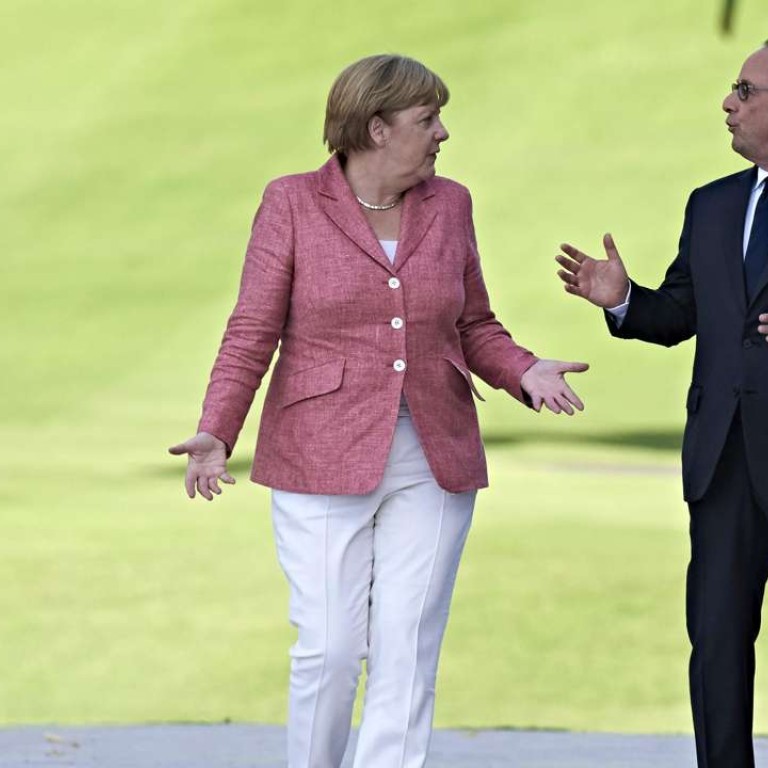
Germany and France seek stronger EU military ties after Brexit, document reveals
Germany and France have outlined plans to deepen European military cooperation, a document showed on Monday, as Britain’s exit from the European Union removes one of the biggest obstacles to stronger EU defence in tandem with Nato.
In potentially the biggest leap in European defence since the 1990s, Berlin and Paris are laying out ways for the bloc to rapidly deploy forces, with security cooperation emerging as a unifying force for Europe after Britain’s shock vote to leave.
European Commission President Jean-Claude Juncker is set to add to the momentum in his annual State of the Union address on Wednesday by calling for an end to the isolated way in which EU militaries work.
EU leaders will discuss defence cooperation at a summit without Britain on Friday in the Slovak capital Bratislava and could take decisions at the end of this year.
German Foreign Minister Frank-Walter Steinmeier will discuss closer military ties with his counterparts from the Baltic states in Riga on Tuesday, while German Defence Minister Ursula von der Leyen will raise the issue during a meeting with her Norwegian counterpart in Bodoe, Norway, on Wednesday.

Such a move falls well short of a European army, but would mark a step in the EU’s ambitions in areas from disaster relief to peacekeeping. It could help revive the EU battle groups that have been operational since 2007 but have never been used.
Berlin and Paris said they also sought a strengthening of the Eurocorps, a joint military group of some EU and NATO states, allowing it to play a bigger role in EU operations.
The decision to relaunch closer military cooperation, which was first tried by Britain and France in 1998, goes beyond Britain’s decision to leave the EU, diplomats say. No European nation has the resources alone to confront failing states on Europe’s borders, Islamist militants or a resurgent Russia.
The joint paper floats the idea of setting up the EU’s own medical resources, joint land, air and sea transport capabilities to complement the bloc’s missions and enhancing common training among officers across the 27 states.
France and Germany, as well as senior EU defence officials, are also keen to work with the U.S-led North Atlantic Treaty Organisation (NATO), which counts 22 of the EU’s 28 members. “We ... recognise that a stronger and more capable European defence will also lead to a stronger NATO,” the document read.
The paper appears timed to complement efforts in Brussels led by EU foreign policy chief Federica Mogherini to show that the bloc is reacting to citizens’ concerns about security in the wake of attacks in European cities this year and to show that the EU remains relevant despite Brexit.
Britain and France are Europe’s leading military powers. Britain is also one of only a small handful of NATO allies to meet the NATO objective of spending more than 2 percent of its national output on defence. Britain had long been sceptical of expanding EU military missions, wanting to avoid duplication with NATO.
In a separate EU document, Mogherini calls on European governments to build “strategic autonomy”, suggesting independence from the United States. She urges “permanent structured cooperation” allowing some EU armies to work together when some countries do not wish to.
“This is about coalitions of the willing,” said a senior EU defence official. “There is no better time to try this.”
Mogherini, Berlin and Paris want EU governments to consider better financing for the bloc’s missions and operations.
They would like to see a defence research programme in the EU budget for the first time, starting with the next common budget for 2021-27. France and Germany proposed starting with setting aside 90 million euros to that end already in 2017-2019.
While that is dwarfed by the United States’ multi-billion-dollar military research budget, it could help prevent the EU from falling behind in the military arena or having to rely on countries such as South Korea and Israel for hardware.
One idea under discussion is a European investment fund for defence, which would allow EU governments who pay into it to also borrow so as to ensure that funds are available for joint defence programmes. These range from new helicopters to drones.
The fund, which could start on a small scale in 2017, could be backed by the European Investment Bank to finance projects.

